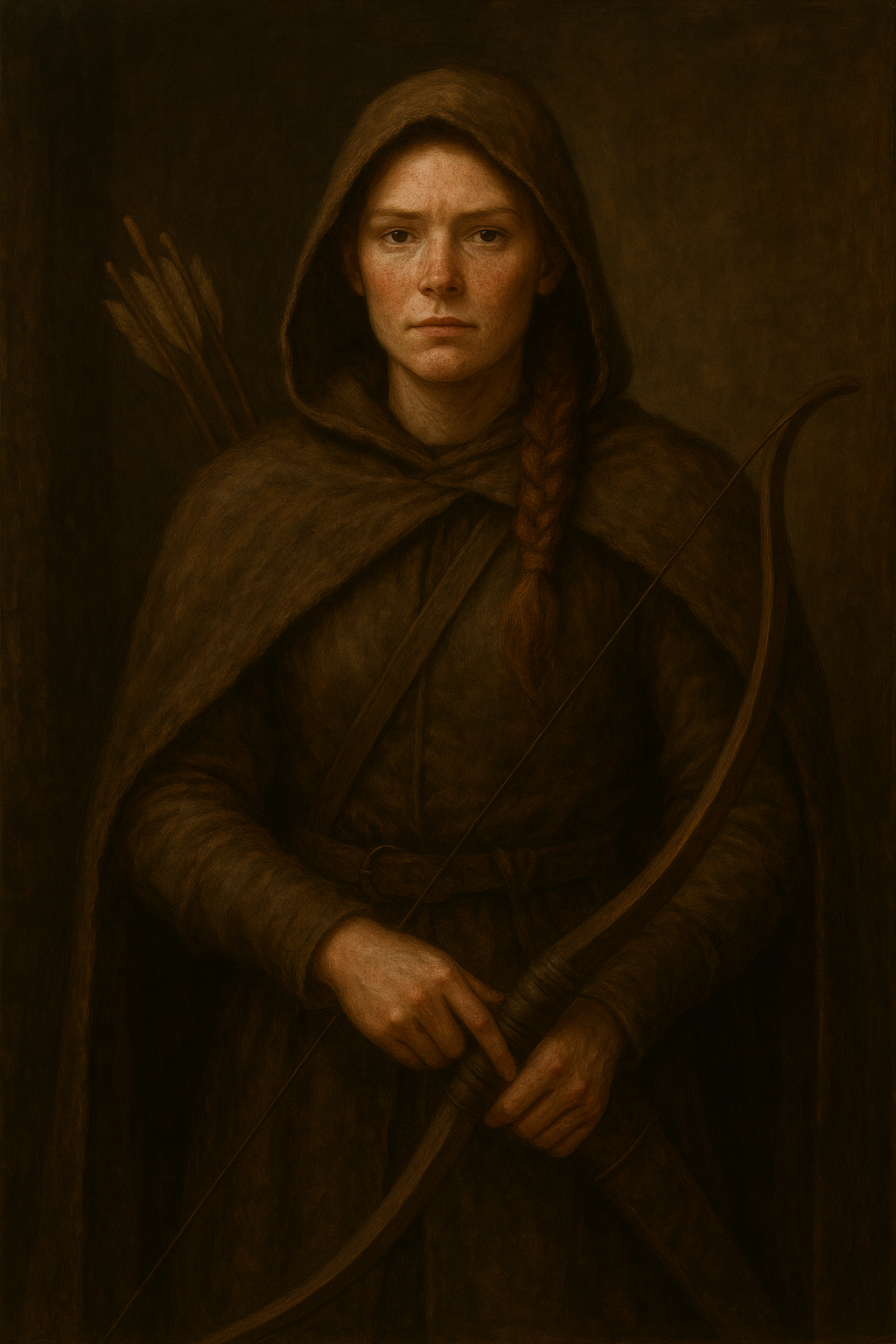Being the only woman among the guards was not a privilege.
It was a brand.
Not written, not openly spoken, but present in every muffled laugh, in every challenging glance.
The others drank together, trained together, shared stories.
She didn’t.
Astrid wasn’t there to be part of a pack.
She wasn’t there to please anyone.
She had come from far away, from the frontier lands where the wind cuts like a blade and silence is survival.
In Laaren she had learned to follow tracks in the snow, to move without a sound, to draw her bow with fingers numb from the cold.
She had learned early that those who make too much noise, in the North, die.
It was as a child that she first heard about the Abyss.
There they called it by many names: Breath of the Earth, Black Mouth, the Rift.
Every story changed, but they all ended the same way:
“Whoever stares too long, sooner or later falls.”
Astrid listened in silence, without fear.
To her, those stories were not warnings: they were invitations.
At night, she drew the Abyss in the dust, dreamed of it, searched for it in the closed eyes of the dead after the hunts.
When a caravan bound for the Capital passed through the village, Astrid climbed aboard without looking back.
She carried only a bow, a knife, and a tanned hide cloak.
Seeing the Abyss with her own eyes was like breathing for the first time.
A perfect crater, a void that felt alive, a wind that rose from its depths like a summons.
She stood still for hours, staring, and when she finally moved, she knew it was not enough.
When she heard they were recruiting new guards to watch the rim and the upper levels, she didn’t hesitate.
She had no titles, no formal training. Only trials.
And she passed them all.
Silent.
Swift.
Lethal.
She wasn’t there for the uniform.
Not for the pay.
She was there to descend.
To understand.
To feed the hunger that had burned inside her since childhood.
There were always people around the Abyss.
Curious travelers, merchants, pilgrims from every corner of the continent: all of them wanted to see it at least once in their lives.
Some stood in silence, as if before an altar.
Others laughed, threw stones, bet on how long it would take for it to swallow them if they jumped.
Astrid knew them well.
She watched from the guard platforms, her hands tight on the shaft of her spear.
But that day was different.
The air was tense, electric.
Too many people talking loudly, too many feverish eyes staring into the void.
Two brawls had already broken out on the outer ring: merchants accusing each other of theft, pilgrims fighting for a spot close to the edge.
Then Astrid saw the group.
A crowd gathered not to look, but to listen.
A man stood on a wooden crate, his face shadowed by a hood.
He was no city preacher. You could tell by the way he stood, back straight like a spear, and by the tone of his voice: clear, cutting, slicing through the noise.
“The Mouth is open,” he was saying, “and we keep ignoring it.
It is not emptiness, it is a sign.
A sign that the world is sick, and the day of reckoning is near.”
Some in the crowd nodded, others murmured, uneasy.
Astrid felt a chill, but not of fear.
She had heard preachers before, fanatics who came to shout their truths at the Abyss, but this man did not shout.
He spoke softly, as if he knew something the others didn’t.
And for an instant Astrid felt as if his words weren’t meant for the crowd—
but for her.
The man paused.
The crowd fell silent, as if all had stopped breathing.
Then he raised his face toward the rim of the crater and shouted:
“The Black Prince has returned!
As a thousand years ago, he now speaks to us in our dreams!
Do you hear him?
Do you see him?
He calls us!”
Murmurs rippled through the crowd, some people praying, others panicking.
A woman burst into tears, an old man dropped to his knees.
Astrid shivered.
She had never heard that name spoken aloud except in childhood fireside tales.
The Black Prince was a legend, a figure the elders used to scare children.
Yet for an instant, she thought she heard something.
A whisper, distant, rising from the depths and brushing her ear like a cold wind.
“Only the chosen can hear his call!” the man continued, his eyes shining with a feverish light.
“And when enough of us have gathered… he will move!”
The crowd erupted: shouts, curses, cries.
A stone flew, barely missing the preacher’s head.
Astrid’s hand went to her knife.
This wasn’t just noise.
This was about to turn into something worse.
She followed the man at a distance as he left the crowd, slipping between groups of travelers, still muttering to himself, seeking new listeners.
When he reached a deserted stretch of the rim, Astrid struck.
She wrapped an arm around his neck from behind and dragged him back, pressing the knife to his spine.
“Talk,” she hissed. “Tell me what you know, or I swear I’ll throw you down there and see if your prince comes to fetch you.”
The man trembled, but didn’t scream.
“You don’t understand,” he whispered, breath ragged. “He doesn’t want to be stopped. He wants us to listen.”
Astrid pressed harder.
“Who? Who the hell is talking to you in your dreams?”
The man let out a dry, almost hysterical laugh.
“Not just me. Everyone. And you won’t need to threaten me… you’ll hear him too, sooner or later.”
Astrid threw him to the ground.
He hit the stone with a grunt.
She planted a knee on his back, twisted his arm behind him, the knife now pressing against the base of his neck.
“Speak plainly,” she growled. “What do you mean we’ll all hear him? Who sent you here?”
He spat dirt and saliva.
“No one sent me… I only carry his voice. He chose me.”
Astrid pressed harder.
“Names. Places. Tell me where you gather.”
He sobbed.
“There are no gatherings… not yet. He unites us in the dreams. When there are enough of us, he will tell us where to go.”
Astrid’s grip tightened.
“And then? What will you do?”
Silence.
Then the fanatic’s voice turned low, almost reverent:
“Heh… we will do what he wants.”
Astrid slammed him against the stone.
“What the hell does that mean?”
The man laughed, broken, manic.
“You already know. I don’t need to tell you. You want to see it as much as we do.”
Astrid felt a chill crawl up her spine.
For an instant, her blade trembled.
Then she hauled him up by the collar and shoved him toward the edge of the crater.
He screamed, clawing for balance.
“Last chance,” Astrid said, her voice cold, steady.
“If you’re lying to me, you won’t live to hit the bottom. Tell me what you know about the Abyss.”
He stopped struggling. And smiled.
Not a normal smile — one of those twisted ones, too wide, showing too many teeth.
“It’s alive,” he whispered. “And it remembers us.”
Astrid shoved him to the ground again, breathing hard.
For a moment, she wanted to end it right there, let him bleed into the stone.
But she stopped.
She bound him with his own rope and left him slumped against a pillar, still giggling.
Then she rose, dust-covered knife in hand, and stared at the Abyss.
The wind rose slow, cold.

